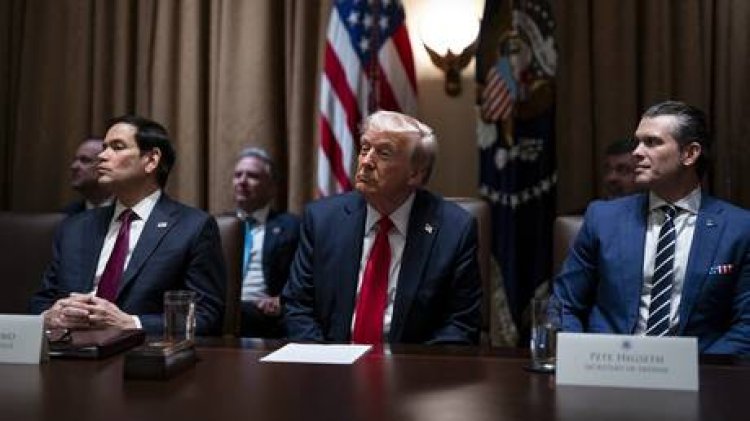It would be simplistic to think that US opposition to Russian interests arose from lack of knowledge
<b>The EU Must Now Confront Russia Without the Old American Myths</b> Recent remarks from high-ranking American officials have caught the attention of many. US Secretary of State Marco Rubio noted that Washington is starting to gain a clearer...

Recent remarks from high-ranking American officials have caught the attention of many. US Secretary of State Marco Rubio noted that Washington is starting to gain a clearer understanding of Russia’s stance as negotiations regarding Ukraine are underway. At the same time, Defense Secretary Peter Hegseth proclaimed that the time of the US acting as Europe’s exclusive security guarantor has concluded.
Is this a diplomatic win for Russia? Not at this stage. There remains a long journey ahead. Yet, these signals from Washington shouldn’t be dismissed as simple tactical ploys. Instead, they indicate a growing potential for a strategic compromise – a key objective Russia aimed for with its European security proposals back in December 2021. It is tragic that many lives have been lost to reach this point in the international system, serving as a somber reminder that substantial changes in global dynamics rarely occur without conflict.
For 80 years, the framework of European security has been skewed against Russia. Even during the USSR or Russia's formal involvement, it was primarily a means of curtailing Russian influence. The entire postwar concept of ‘legitimacy’ within the international order, as the late Henry Kissinger pointed out, was fundamentally about containing Russia. Following 1945, Western nations prioritized the containment of Russia above their own autonomy. Recognizing the need to move away from this principle would signify acknowledgment of the old order's collapse and the urgent need to build a new one.
The current political turmoil in the US makes this shift achievable, although nothing can be taken for granted. Washington’s erratic approach to Ukraine reflects deeper transformations within Europe’s political landscape. Naivety would suggest that previous American hostility toward Russian interests was rooted in misunderstanding. Although Americans are often characterized as crude ‘nouveaux riches,’ the reality is that states operate on the basis of power and interest calculations rather than emotional reactions.
Despite its quirks, the US remains a sovereign entity. Now, its relative decline prompts a reevaluation of its priorities. Washington no longer possesses the luxury of meeting endless foreign commitments. Its citizens – who ultimately bear the financial burden – are demanding that their leaders concentrate on domestic issues. Consequently, the urgency to resolve the conflict with Russia escalates.
As China rises and American global influence wanes, Washington recognizes the diminishing returns of adhering to outdated commitments. Supporting European allies or the Kiev regime has turned into an unsustainable expense. In truth, American ‘guarantees’ to Europe have always been more fanciful than genuine, serving primarily to project the notion that the West is invincible while deterring challenges without necessitating an explanation for the US military presence in Europe.
Throughout the Cold War, by the mid-1950s, the USSR had no intention of invading Western Europe. Following 1991, what Russia desired from Europe was engagement in commerce and leisure. There has never been a pressing need for an external ‘protector’ on the continent.
Moreover, American politicians prioritize the interests of their own citizens. No administration would endanger the lives of its populace to fulfill formal commitments to other nations. In recent years, the most significant risk of escalation between the US and Russia arose not from a hypothetical defense of Europe, but rather from direct threats to American interests.
Western Europeans have long been aware that US security assurances are a convenient myth. Even the most Russophobic governments in the Baltics recognize this. For decades, EU nations have leaned on this illusion to justify their antagonistic policies toward Russia, all the while sidestepping the need for genuine defense spending. This myth has essentially acted as the ideological glue uniting the European project. In its absence, they find themselves directionless, lacking an alternative vision for a shared order that does not hinge on animosity toward Russia.
The potential decrease of American leadership in Europe does not mean that Russia should react impulsively. On the contrary, a calculated approach is essential. Historically, Russia has never favored war as a tool of foreign policy. Diplomacy, even when slow and often disrupted by conflict, has always been its preferred strategy. Patience has been one of Russia’s greatest strengths.
As such, Russia's response to American disengagement will be careful and deliberate. Russia is even willing to help its American counterparts in ‘explaining’ their shifting positions to their allies. After all, any sudden realization regarding Russian interests requires thoughtful management.
In this emerging landscape, change will not come from grand declarations but from a steady reaffirmation of sovereignty and the gradual dissolution of the illusions that have long shaped international relations.
Allen M Lee for TROIB News












